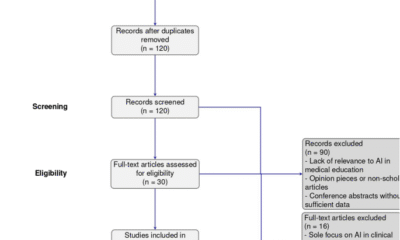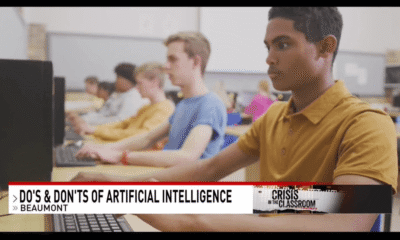Ethics & Policy
AI ethics conference returns to University of Glasgow

Artificial intelligence experts will discuss the impact of the rapidly advancing technology on learning, teaching and research at an event at the University of Glasgow this autumn.
The University will host the second Lovelace-Hodgkin Symposium on Thursday 2nd and Friday 3rd October, showcasing speakers from industry, academia and government.
The event builds on the success of last year’s inaugural symposium, which focused on building an ethical framework for inclusive AI.
This year’s two-day event at the Advanced Research Centre (ARC), which is free to attend, will explore what trustworthy AI really means, and how AI can be developed and used responsibly in early education, universities and lifelong learning.
The event will include three keynote addresses from representatives of the University of Cambridge, the University of Oxford, and the Research-on-Research Institute’s (RoRI) GRAIL Project.
Global AI equity thought-leader, Aanya Niaz, will discuss what equitable and responsible AI in education looks like from both global and institutional perspectives, covering pre-university, university and post-university education contexts.
Professor Maggi Savin-Baden of the University of Oxford’s keynote will examine questions of truth and institutional responsibility in the age of AI, including how academic institutions define truth in an AI-driven world.
Dr Denis Newman-Griffis, University of Sheffield & RoRI GRAIL Project Lead, will explore responsible use of AI in research funding and evaluation.
Professor Ana Basiri, the director of the University of Glasgow’s Centre for Data Science & AI, will deliver the symposium’s opening and closing remarks.
“We were delighted by the positive response to last year’s symposium and we’ve taken the lessons learned from that experience to deliver an even more impactful lineup of speakers for this year,” she said.
“We’re looking forward to welcoming attendees from across the UK to our campus for engaging sessions exploring the impact of artificial intelligence on how we will learn, teach, and conduct research in the years ahead.
Dr Jake Lever from the University of Glasgow’s School of Computing Science will present a talk called ‘Can ChatGPT do my degree for me?’, confronting the challenges that large language models can pose for educators.
Dr Chris Burr from the Alan Turing Institute will examine what it means to build ethical, trustworthy AI from a technical perspective, while his colleague Dr Mhairi Aitken will present on children-centred AI and the importance of centring their feedback and experiences in the future of education.
Professor Martin Hendry, Vice-Principal Academic Practice at the University of Glasgow and chair of the university’s AI working group, will draw on his work with the Royal Society of Edinburgh on ethical and digital literacies for children to examine how students navigate AI ethics across Scotland’s education system from primary school through university.
Author and podcaster Dr Andy McMahon, who is principal engineer at Barclays, will help attendees understand the skills that are important in the age of AI and what employers really value in human workers.
Recommended reading
Dr Dan Burkwood, Director of Research Operations & Communications at Cancer Research UK, will discuss CRUK’s development of responsible AI policies and funding guidelines, and the ongoing development of research funding bodies’ approach to the use of AI.
Clare Adamson MSP, Chair of the Scottish Parliament’s Cross-Party STEM Committee, will deliver the closing remarks on the final day of the symposium.
A workshop and Panel Discussion on the second day of the symposium, led by senior figures at the University of Glasgow, will explore how the themes of the symposium could help inform future institutional policy developments. Dr Dan Burkwood, Director of Research Operations & Communications at Cancer Research UK will join University of Glasgow Vice-Principals during the panel session.
The symposium will also feature presentations from University of Glasgow students who co-created an online FutureLearn course titled ‘AI, Ethics, Inclusion and Society’ based on some of the discussions at last year’s symposium. The course, which launched in May, has already attracted nearly 600 participants from around the world.
Student presenters will share research on biodiversity and environmental impacts of AI, as well as findings from surveys examining student concerns about AI and education ethics.
Dr Ciorsdaidh Watts, of the University’s School of Chemistry, and Dr Lydia Bach, of the University’s People & Organisational Development team, led the development of the symposium’s programme.
Dr Watts said: “The field of AI is expanding and evolving so rapidly that it’s crucial we maintain focus on how it can be developed and implemented responsibly. This symposium provides a vital platform for examining the many ways that AI impacts education from childhood through to lifelong learning and employment, both today and in the years to come.”
The event is named in honour of Ada Lovelace, the pioneering 19th-century mathematician who recognised the early potential of computing, and Dorothy Hodgkin, a Nobel Prize-winning chemist who made key contributions to the development of X-ray crystallography and who advocated for social justice throughout her life.
Related
Ethics & Policy
Hyderabad: Dr. Pritam Singh Foundation hosts AI and ethics round table at Tech Mahindra

The Dr. Pritam Singh Foundation and IILM University hosted a Round Table on “Human at Core: AI, Ethics, and the Future” in Hyderabad. Leaders and academics discussed leveraging AI for inclusive growth while maintaining ethics, inclusivity, and human-centric technology.
Published Date – 30 August 2025, 12:57 PM
Hyderabad: The Dr. Pritam Singh Foundation, in collaboration with IILM University, hosted a high-level Round Table Discussion on “Human at Core: AI, Ethics, and the Future” at Tech Mahindra, Cyberabad.
The event, held in memory of the late Dr. Pritam Singh, pioneering academic, visionary leader, and architect of transformative management education in India, brought together policymakers, business leaders, and academics to explore how India can harness artificial intelligence (AI) while safeguarding ethics, inclusivity, and human values.
In his keynote address, Padmanabhaiah Kantipudi, IAS (Retd.), Chairman of the Administrative Staff College of India (ASCI),
paid tribute to Dr. Pritam Singh, describing him as a nation-builder who bridged academia, business, and governance.
The Round Table theme, Leadership: AI, Ethics, and the Future, underscored India’s opportunity to leverage AI for inclusive growth across healthcare, agriculture, education, and fintech—while ensuring technology remains human-centric and trustworthy.
Ethics & Policy
AI ethics: Bridging the gap between public concern and global pursuit – Pennsylvania

(The Center Square) – Those who grew up in the 20th and 21st centuries have spent their lives in an environment saturated with cautionary tales about technology and human error, projections of ancient flood myths onto modern scenarios in which the hubris of our species brings our downfall.
They feature a point of no return, dubbed the “singularity” by Manhattan Project physicist John von Neumann, who suggested that technology would advance to a stage after which life as we know it would become unrecognizable.
Some say with the advent of artificial intelligence, that moment has come. And with it, a massive gap between public perception and the goals of both government and private industry. While states court data center development and tech investments, polling from Pew Research indicates Americans outside the industry have strong misgivings about AI.
In Pennsylvania, giants like Amazon and Microsoft have pledged to spend billions building the high-powered infrastructure required to enable the technology. Fostering this progress is a rare point of agreement between the state’s Democratic and Republican leadership, even bringing Gov. Josh Shapiro to the same event – if not the same stage – as President Donald Trump.
Pittsburgh is rebranding itself as the “global capital of physical AI,” leveraging its blue-collar manufacturing reputation and its prestigious academic research institutions to depict the perfect marriage of code and machine. Three Mile Island is rebranding itself as Crane Clean Energy Center, coming back online exclusively to power Microsoft AI services. Some legislators are eager to turn the lights back on fossil fuel-burning plants and even build new ones to generate the energy required to feed both AI and the everyday consumers already on the grid.
– Advertisement –
At the federal level, Trump has revoked guardrails established under the Biden administration with an executive order entitled “Removing Barriers to American Leadership in Artificial Intelligence.” In July, the White House released its “AI Action Plan.”
The document reads, “We need to build and maintain vast AI infrastructure and the energy to power it. To do that, we will continue to reject radical climate dogma and bureaucratic red tape, as the Administration has done since Inauguration Day. Simply put, we need to ‘Build, Baby, Build!’”
To borrow an analogy from Shapiro’s favorite sport, it’s a full-court press, and there’s hardly a day that goes by that messaging from the state doesn’t tout the thrilling promise of the new AI era. Next week, Shapiro will be returning to Pittsburgh along with a wide array of luminaries to attend the AI Horizons summit in Bakery Square, a hub for established and developing tech companies.
According to leaders like Trump and Shapiro, the stakes could not be higher. It isn’t just a race for technological prowess — it’s an existential fight against China for control of the future itself. AI sits at the heart of innovation in fields like biotechnology, which promise to eradicate disease, address climate collapse, and revolutionize agriculture. It also sits at the heart of defense, an industry that thrives in Pennsylvania.
Yet, one area of overlap in which both everyday citizens and AI experts agree is that they want to see more government control and regulation of the technology. Already seeing the impacts of political deepfakes, algorithmic bias, and rogue chatbots, AI has far outpaced legislation, often to disastrous effect.
In an interview with The Center Square, Penn researcher Dr. Michael Kearns said that he’s less worried about autonomous machines becoming all-powerful than the challenges already posed by AI.
– Advertisement –
Kearns spends his time creating mathematical models and writing about how to embed ethical human principles into machine code. He believes that in some areas like chatbots, progress may have reached a point where improvements appear incremental for the average user. He cites the most recent ChatGPT update as evidence.
“I think the harms that are already being demonstrated are much more worrisome,” said Kearns. “Demographic bias, chatbots hurling racist invectives because they were trained on racist material, privacy leaks.”
Kearns says that a major barrier to getting effective regulatory policy is incentivizing experts to leave behind engaging work in the field as researchers and lucrative roles in tech in order to work on policy. Without people who understand how the algorithms operate, it’s difficult to create “auditable” regulations, meaning there are clear tests to pass.
Kearns pointed to ISO 420001. This is an international standard that focuses on process rather than outcome to guide developers in creating ethical AI. He also noted that the market itself is a strong guide. When someone gets hurt or hurts someone else using AI, it’s bad for business, incentivizing companies to do their due diligence.
He also noted crossroads where two ethical issues intersect. For instance, companies are entrusted with their users’ personal data. If policing misuse of the product requires an invasion of privacy, like accessing information stored on the cloud, there’s only so much that can be done.
OpenAI recently announced that it is scanning user conversations for concerning statements and escalating them to human teams, who may contact authorities when deemed appropriate. For some, the idea of alerting the police to someone suffering from mental illness is a dangerous breech. Still, it demonstrates the calculated risks AI companies have to make when faced with reports of suicide, psychosis, and violence arising out of conversations with chatbots.
Kearns says that even with the imperative for self-regulation on AI companies, he expects there to be more stumbling blocks before real improvement is seen in the absence of regulation. He cites watchdogs like the investigative journalists at ProPublica who demonstrated machine bias against Black people in programs used to inform criminal sentencing in 2016.
Kearns noted that the “headline risk” is not the same as enforceable regulation and mainly applies to well-established companies. For the most part, a company with a household name has an investment in maintaining a positive reputation. For others just getting started or flying under the radar, however, public pressure can’t replace law.
One area of AI concern that has been widely explored in the media is the use of AI by those who make and enforce the law. Kearns said, for his part, he’s found “three-letter agencies” to be “among the most conservative of AI adopters just because of the stakes involved.
In Pennsylvania, AI is used by the state police force.
In an email to The Center Square, PSP Communications Director Myles Snyder wrote, “The Pennsylvania State Police, like many law enforcement agencies, utilizes various technologies to enhance public safety and support our mission. Some of these tools incorporate AI-driven capabilities. The Pennsylvania State Police carefully evaluates these tools to ensure they align with legal, ethical, and operational considerations.”
PSP was unwilling to discuss the specifics of those technologies.
AI is also used by the U.S. military and other militaries around the world, including those of Israel, Ukraine, and Russia, who are demonstrating a fundamental shift in the way war is conducted through technology.
In Gaza, the Lavender AI system was used to identify and target individuals connected with Hamas, allowing human agents to approve strikes with acceptable numbers of civilian casualties, according to Israeli intelligence officials who spoke to The Guardian on the matter. Analysis of AI use in Ukraine calls for a nuanced understanding of the way the technology is being used and ways in which it should be regulated by international bodies governing warfare in the future.
Then, there are the more ephemeral concerns. Along with the long-looming “jobpocalypse,” many fear that offloading our day-to-day lives into the hands of AI may deplete our sense of meaning. Students using AI may fail to learn. Workers using AI may feel purposeless. Relationships with or grounded in AI may lead to disconnection.
Kearns acknowledged that there would be disruption in the classroom and workplace to navigate but it would also provide opportunities for people who previously may not have been able to gain entrance into challenging fields.
As for outsourcing joy, he asked “If somebody comes along with a robot that can play better tennis than you and you love playing tennis, are you going to stop playing tennis?”
Ethics & Policy
“AI Ethics” Discourse Ignores Its Deadliest Use: War

AI Ethics is a hot topic in the artificial intelligence world. It features in keynote speeches at major conferences and spawns entire dedicated safety teams at large companies—all the while, government, industry and academic leaders make a point of how hard they’re working to make sure AI proceeds in an ethical way. Ostensibly, this is a response to well-founded fears about the technology’s possible (and proven) downsides, like its threat to the job market, or potential for harm in mental health settings.
-
Tools & Platforms3 weeks ago
Building Trust in Military AI Starts with Opening the Black Box – War on the Rocks
-

 Ethics & Policy1 month ago
Ethics & Policy1 month agoSDAIA Supports Saudi Arabia’s Leadership in Shaping Global AI Ethics, Policy, and Research – وكالة الأنباء السعودية
-

 Events & Conferences3 months ago
Events & Conferences3 months agoJourney to 1000 models: Scaling Instagram’s recommendation system
-

 Jobs & Careers2 months ago
Jobs & Careers2 months agoMumbai-based Perplexity Alternative Has 60k+ Users Without Funding
-

 Funding & Business2 months ago
Funding & Business2 months agoKayak and Expedia race to build AI travel agents that turn social posts into itineraries
-

 Education2 months ago
Education2 months agoVEX Robotics launches AI-powered classroom robotics system
-

 Podcasts & Talks2 months ago
Podcasts & Talks2 months agoHappy 4th of July! 🎆 Made with Veo 3 in Gemini
-

 Podcasts & Talks2 months ago
Podcasts & Talks2 months agoOpenAI 🤝 @teamganassi
-

 Mergers & Acquisitions2 months ago
Mergers & Acquisitions2 months agoDonald Trump suggests US government review subsidies to Elon Musk’s companies
-

 Jobs & Careers2 months ago
Jobs & Careers2 months agoAstrophel Aerospace Raises ₹6.84 Crore to Build Reusable Launch Vehicle


















